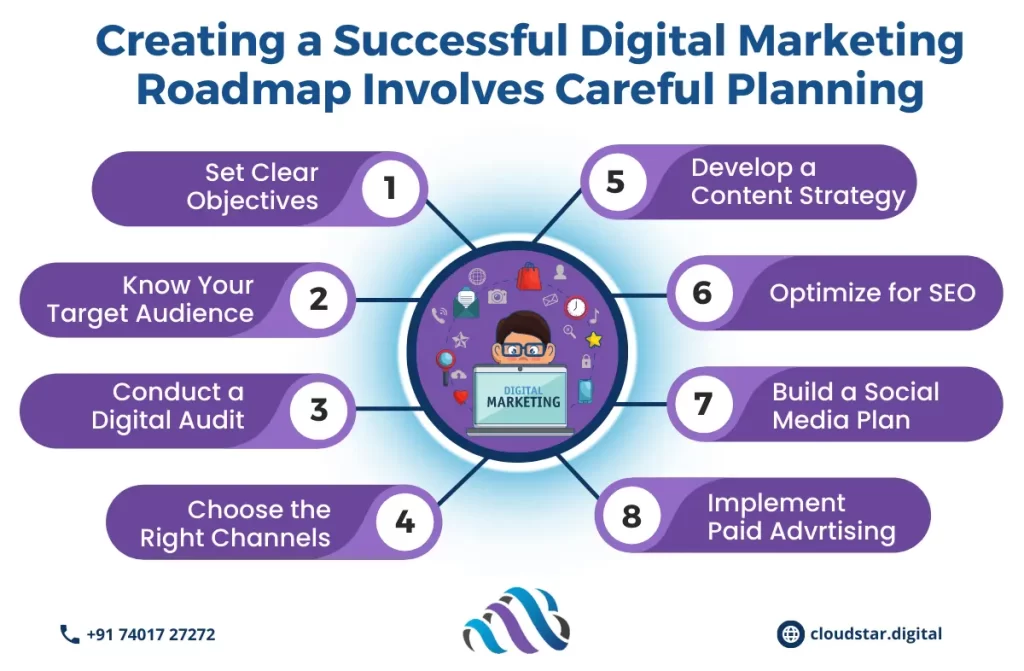In the dynamic landscape of online business, having a well-defined Digital Marketing Roadmap is paramount to achieving success. A robust road map for digital marketing not only guides your efforts but also helps you navigate the intricate pathways of the digital realm. Whether you’re a seasoned marketer or just starting, this step-by-step guide will provide you with the ultimate insights to create an effective digital marketing strategy.
What is Digital Marketing Roadmap?
A Digital Marketing Roadmap is a strategic plan that outlines the step-by-step approach to achieve your digital marketing goals. It serves as a comprehensive guide that encompasses all the essential elements of your online marketing strategy. This roadmap provides a clear direction for your digital marketing efforts, ensuring that they are cohesive, goal-oriented, and effective.
Just like a traditional roadmap helps travelers navigate a journey, a Digital Marketing Roadmap guides businesses and marketers through the complex landscape of online marketing. It typically includes key components such as defining objectives, identifying target audiences, selecting the appropriate digital channels, crafting content strategies, implementing SEO techniques, leveraging social media, utilizing paid advertising, monitoring performance, and adapting the strategy based on insights.

Step 1: Define Your Goals and Objectives
The initial step towards accomplishment is charting a course to your desired endpoint. Outline your digital marketing objectives clearly. Are you aiming for brand awareness, lead generation, increased sales, or something else? These goals will be your North Star throughout your digital marketing roadmap.
Step 2: Know Your Target Audience
Understanding your audience is the key to delivering the most impactful campaigns. Research their demographics, preferences, behaviors, and pain points. This knowledge shapes your content and messaging, ensuring it resonates with your potential customers.
Step 3: Choose the Right Digital Channels
With numerous digital platforms available, it’s crucial to select the ones that align with your target audience and goals. Whether it’s social media, search engines, email marketing, or content marketing, your chosen channels should maximize your reach and engagement.
Step 4: Develop a Content Strategy
Content lies at the heart of digital marketing. Craft quality, proper content that provides value to your audience. Incorporate your chosen keywords like “Digital Marketing Roadmap” and “road map for digital marketing” naturally to enhance your SEO efforts and boost visibility.
Step 5: Search Engine Optimization (SEO)
Optimize your online presence to rank higher on search engine results pages. Utilize your chosen keywords strategically in your website content, meta descriptions, and headers. An effective SEO strategy improves your organic traffic and widens your digital reach.
Step 6: Leverage Social Media
Social media platforms are powerful tools to build brand awareness and engage with your audience. Tailor your content to each platform, maintaining consistency in messaging. Integrate your keywords seamlessly to enhance your social media visibility.
Step 7: Email Marketing
Craft personalized and compelling email campaigns to nurture leads and retain customers. Segment your email list based on demographics and behaviors, and then deliver targeted content that appeals to their needs.
Step 8: Pay-Per-Click (PPC) Advertising
Invest in PPC campaigns to secure prime spots on search engines and other online platforms. Strategic keyword usage in your ad copy and landing pages will improve your ad’s quality score, leading to better ad placements and lower costs.
Step 9: Monitor and Analyze of Digital Marketing Roadmap
Track the performance regularly of your digital marketing efforts. Utilize analytics tools to measure website traffic, conversion rates, engagement, and more. This data-driven approach helps you to make informed adjustments while deciding a strategy.
Step 10: Adapt and Refine
The digital landscape evolves rapidly. Stay updated with industry trends and adjust your digital marketing roadmap accordingly. Adapting to new technologies and consumer behaviors ensures your strategy remains effective in achieving your goals.
What is the Importance of a Digital Marketing Roadmap?
A well-structured Digital Marketing Roadmap is crucial for businesses aiming to establish a strong online presence and achieve long-term success. It provides a clear strategy to navigate the ever-evolving digital landscape, ensuring that marketing efforts align with business goals. Without a Digital Marketing Roadmap, businesses may struggle with inconsistent messaging, inefficient resource allocation, and ineffective marketing campaigns.
Digital Marketing Strategy
A robust strategy is the foundation of digital marketing success. Following a step-by-step roadmap for digital marketing ensures a comprehensive approach. Here’s what you need to focus on:
- Audience Analysis: Understand your target demographic’s needs and preferences.
- Platform Selection: Choose the right platforms like Facebook, LinkedIn, Instagram, etc., based on your goals.
- Content Calendar: Consistency is key. Plan and publish engaging content at regular intervals.
- Performance Tracking: Use analytics tools to measure and refine your campaigns.
- Future-Proof Your Plans: Keep evolving by referring to a digital marketing roadmap PDF for strategy updates.
Why is a Digital Marketing Roadmap Essential?
- Clear Direction:
- Defines specific goals, target audience, and key performance indicators (KPIs).
- Aligns marketing strategies with overall business objectives.
- Helps teams focus on priority tasks and avoid wasted efforts.
- Consistency Across Channels:
- Ensures brand messaging remains uniform across websites, social media, emails, and paid ads.
- Builds trust and credibility with customers through a cohesive brand voice.
- Reduces confusion and enhances user experience across digital touchpoints.
- Optimized Budgeting:
- Helps allocate resources effectively between organic and paid marketing efforts.
- Prevents overspending on ineffective strategies and optimizes return on investment (ROI).
- Guides decision-making on ad spend, content creation, and automation tools.
- Performance Tracking and Data-Driven Decisions:
- Enables continuous monitoring and optimization of campaigns.
- Provides insights into customer behavior, engagement rates, and conversion metrics.
- Facilitates A/B testing and refinement of strategies based on real-time data.
- Competitive Advantage:
- Allows businesses to stay ahead by leveraging the latest trends and technologies.
- Adapts to market changes, algorithm updates, and consumer preferences.
- Enhances agility in responding to industry shifts and emerging opportunities.
- Scalability and Long-Term Growth:
- Supports business expansion by creating a roadmap for digital marketing success.
- Ensures sustainable growth with structured and scalable marketing strategies.
- Enables businesses to plan for future campaigns, partnerships, and audience expansion.
By following a Digital Marketing Roadmap, businesses can streamline their marketing efforts, improve efficiency, and drive measurable success. Without it, companies risk falling behind competitors and missing valuable opportunities to engage their audience effectively.
What are the elements of a digital marketing roadmap?
A digital marketing roadmap includes:
- Goals and Objectives: Clear and measurable targets aligned with business objectives.
- Target Audience: Understanding and defining the ideal customer personas.
- Channel Selection: Identifying key digital channels (SEO, PPC, social media) to reach the audience effectively.
- Content Strategy: Crafting engaging and relevant content across channels.
- Budget Allocation: Allocating resources and budgets for each strategy.
- Implementation Timeline: Setting timelines and milestones for strategy execution.
- Measurement and Analytics: Establishing metrics to track success and refine strategies for continual improvement.
How to Build a Digital Marketing Roadmap
Creating a comprehensive Digital Marketing Roadmap involves multiple steps to ensure effective execution. Follow these essential steps to build a structured Roadmap for digital marketing:
Define Business Goals
- Set measurable and achievable marketing objectives.
- Align goals with overall business strategies.
Identify Target Audience
- Conduct market research and build detailed buyer personas.
- Segment audience based on demographics, behavior, and interests.
Choose the Right Marketing Channels
- Evaluate and select platforms such as SEO, PPC, social media, and email marketing.
- Ensure an integrated approach for maximum reach.
Develop a Content Strategy
- Create high-quality, engaging content tailored to the audience.
- Implement SEO best practices to improve organic visibility.
Implement Marketing Automation
- Use tools to streamline email marketing, lead nurturing, and customer engagement.
- Optimize workflows to improve efficiency.
Monitor and Adjust
- Regularly analyze performance metrics.
- Adjust strategies based on insights and market trends
Tips to Enhance/Improve Your Digital Marketing Roadmap
To maximize the impact of your Roadmap for digital marketing success, consider the following expert tips:
- Enhance Mobile Optimization: Ensure all digital content is mobile-friendly for a seamless user experience.
- Leverage Data Analytics: Use insights from analytics tools to refine strategies.
- Emphasize Personalization: Create personalized experiences to boost customer engagement.
- Stay Updated with Trends: Continuously adapt to emerging digital marketing trends.
- Test and Optimize: Conduct A/B testing on campaigns to determine the most effective strategies.
Tools Used in Digital Marketing Roadmaps
Leveraging the right tools is crucial to executing an effective Digital marketing strategy roadmap. Here are some essential tools for building and refining your Roadmap for digital marketing success:
- SEO Tools: Google Analytics, Ahrefs, SEMrush
- Content Management Systems: WordPress, HubSpot
- Social Media Management: Hootsuite, Buffer
- Email Marketing: Mailchimp, ConvertKit
- Marketing Automation: Marketo, HubSpot
- PPC Management: Google Ads, Facebook Ads Manager
By following a strategic Digital marketing strategy roadmap, businesses can streamline their marketing efforts, achieve better ROI, and stay competitive in the digital landscape. Implementing the latest tools and continuously refining your Roadmap for digital marketing will ensure sustainable growth and success.
Unlocking Salary Potential in Digital Marketing
Digital marketing has evolved into one of the most lucrative career paths. With the right roadmap for digital marketing, you can unlock your true earning potential. Here’s how:
- Know Your Niche: Whether it’s SEO, content marketing, social media, or PPC, mastering a specific domain boosts your market value.
- Upskilling is Key: Stay ahead with certifications in platforms like Google Ads, HubSpot, and others.
- Networking Matters: Build a network of like-minded professionals to increase opportunities.
- Practical Experience Pays: Real-world projects showcase your expertise better than theoretical knowledge.
- Access Resources: Download a digital marketing roadmap PDF to stay on track with evolving industry trends.
By following a tailored roadmap for learning digital marketing, you can pave the way to a higher salary bracket and professional growth.
What is the Future of Digital Marketing – What to Expect
As the digital world advances, several trends will shape what is the future of digital marketing?:
- Omnichannel Marketing: Brands must create seamless experiences across websites, mobile apps, social media, and offline stores. A well-integrated marketing strategy ensures that customers receive consistent and personalized messaging at every touchpoint.
- AI-Powered Content Creation: AI tools will help marketers generate high-quality content faster, improving productivity while maintaining relevance. Machine learning will assist in content optimization, helping brands create compelling blog posts, social media captions, and product descriptions.
- Interactive & Shoppable Content: Consumers increasingly engage with brands through interactive experiences such as quizzes, live videos, and AR filters. Shoppable content will enable users to make purchases directly within digital platforms, streamlining the buying journey.
- Influencer Marketing Evolution: The future of influencer marketing will focus on micro-influencers who offer authenticity and niche audience connections. Brands will invest in influencer collaborations that prioritize engagement over reach.
- How 5G Will Transform Digital Marketing: With low latency and ultra-fast connectivity, businesses can leverage real-time data for hyper-personalized campaigns.
Conclusion
To conclude, a comprehensive Digital Marketing Roadmap is pivotal for a thriving online marketing strategy. Adhering to this guide equips you to craft, execute, and refine a strategy aligned with your goals and appealing to your audience. Seamlessly integrate key terms like “Digital Marketing Roadmap” for enhanced online visibility and SEO. As you embark on your digital marketing journey, remember that each step is interconnected, empowering you to make informed decisions that propel your business forward.

